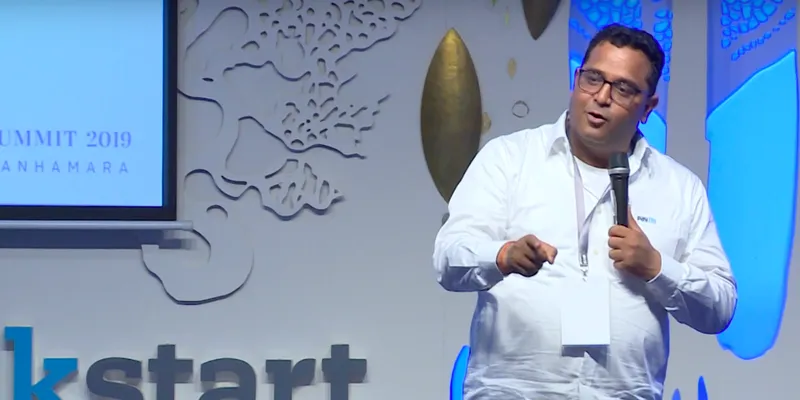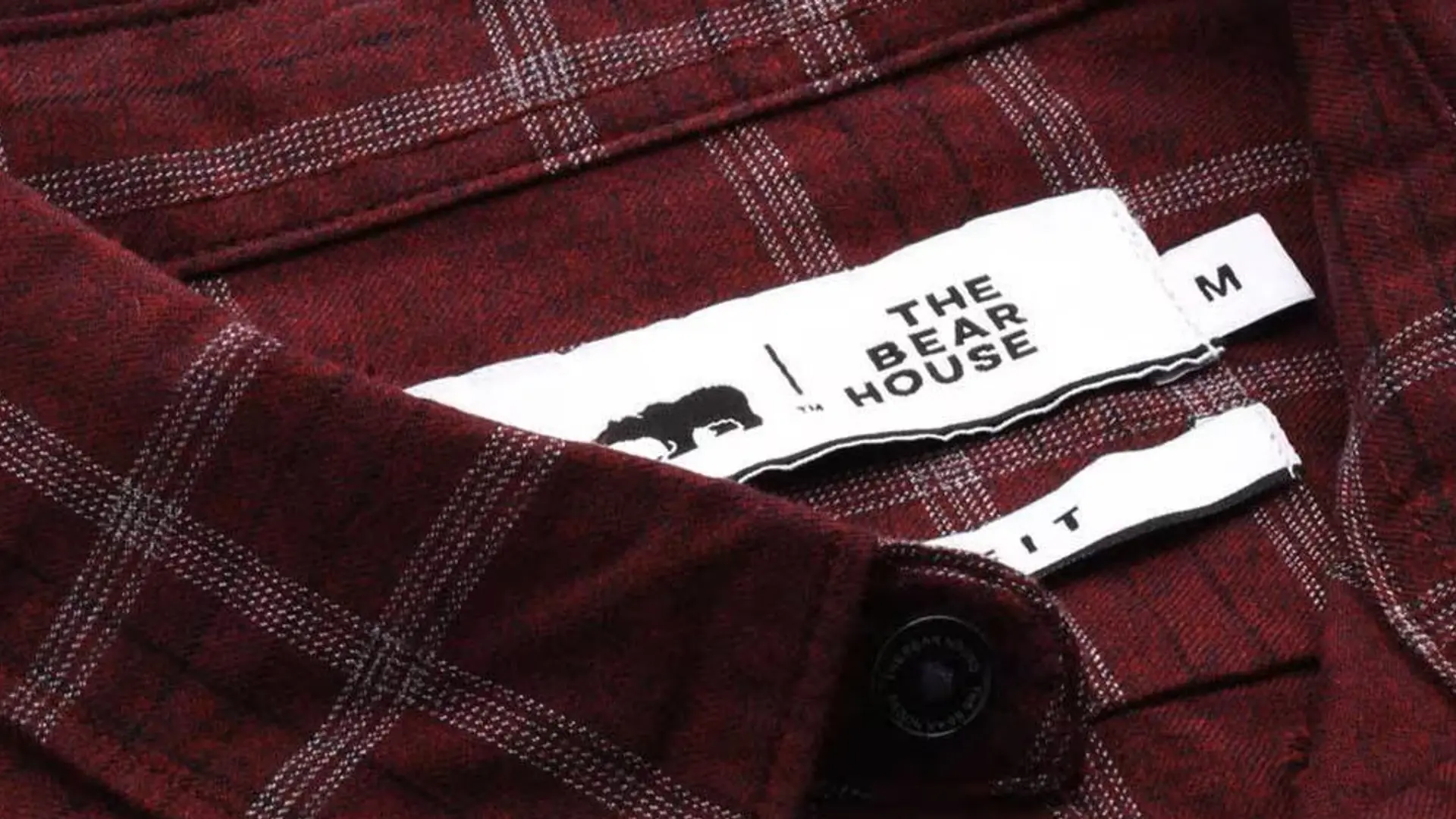‘Go big or go home’ - Vijay Shekhar Sharma
Dreaming big is what Vijay passionately believes in. Small wonder then that “Go big or go home,” is the poster right at the entrance of Paytm’s corporate office in Delhi.
Every good story has a hero. And every good hero has a story in him — Vijay Shekhar Sharma’s meteoric, almost incredible, rise from a small village of Harduaganj near Aligarh is a classic new India story.
Vijay’s story can be compared to the story of another small-town boy who made it big: Mahendra Singh Dhoni. Just like Dhoni, Vijay too is self-effacing in ‘real’ life, a CEO who has no pretensions, and who speaks from the heart. People love Vijay because he is a genuine and a heartwarming person. The startup world loves him because he also epitomises startup resilience.

Vijay Shekhar Sharma addressing the audience at the Kalaari Annual Summit 2019
Also read: Three things you didn't know Vijay Shekhar Sharma, the man behind the entrepreneur
When he shares his life story, you get the sense that Vijay truly understands what it takes to succeed in the often-brittle world of entrepreneurship. He has been there. He has gone through that. He does not apologise for his roots; instead, he embraces them. Vijay has the ability to make you laugh because he himself laughs at his and life’s idiosyncrasies — it’s part of what makes him one of the most disarming and charming CEOs today. But the self-effacing humour doesn’t take away Vijay’s staunch belief in inspiring change. His life itself can be a metaphor for the startup journey.
Vijay’s success is inspiring a whole generation of entrepreneurs — those who may not necessarily have a pedigree background — but who believe that they can dream big even if they are from a village with patchy internet or mobile connectivity.
Dreaming big is what Vijay passionately believes in. Small wonder then that “Go big or go home,” is the poster right at the entrance of Paytm’s corporate office in Delhi.
When I met Vijay in Delhi to request him to speak at the Kalaari Summit, we ended up chatting for almost two hours about India’s growth opportunities and his vision for mass entrepreneurship. What I took away was his enthusiasm and serious commitment towards helping Indian entrepreneurs.
“A promise is a promise,” he told me, when he confirmed his availability, and that is evidence of the support Vijay is willing to give to the startup ecosystem, and what has made him really successful. Read on for Vijay’s insights on life, entrepreneurship, and dreaming big at the Kalaari Summit: A little bit of Hindi, a little bit of English, a little bit of emotion, and a lot of inspiration — that in essence was Vijay.
Overcoming circumstances
“I was a 12-year-old kid who used to see children come to my school without chappals. At school, I wrote a poem:
“Mein gareebi hun; mein tumhe pyar karti hun; mein tumhe chod nahin sakti kyunki tum mujhse jyada pyar karti ho. (I am poverty; I love you; I can’t leave you because you love me more than I do)."
It was a poem that expressed my bewilderment at the inequalities in life. But I believe that poverty is often entrenched in the mind. You are not poor in terms of the chances you can receive in life.
Engineering your values for life
"I was one among only two others from my village to go on and study engineering. Now, if you were studying in a Hindi-medium school back in the 1990s, you had problems of a very different kind! Not only do you struggle to receive any coaching, but you also wouldn’t get books! I told my mom about this, only for her to reply, 'Lalla, please study as much as you can; we don’t have money. Your sisters have to get married'.
"So, that’s when I realised I have to do this on my own. Moreover, the engineering classes in Delhi are held in English, and here I was from a Hindi-medium background.
“My life then was like that line from the Hindi movie — Taare Zameen Par — “I can see your lips move, but I can’t understand.”
During the exams, we would read the answers and not know the questions because the questions were written in English. I taught myself to read the same book in Hindi and English so that I could teach myself the language.
Bhagwan meherban, toh gadha pahelwan (When God blesses you, even the donkey can become a wrestler). By sheer fluke, I passed my engineering, and I told myself:
“Rote hue aate hai sab, hasta hua jo jayega. Wo mukandar ka sikandar kehlayega.”
Converting obstacles into opportunities
The turning point in my life came when one Sunday I went to the Dharia Gunj market in Delhi. There, I picked up a second-hand Forbes magazine and read about how companies such as Apple, Intel, and HP built companies from a basement garage. More than anything in the world then, I wanted to go to Stanford and Silicon Valley. But I didn’t have the money or the resources. That’s when I told myself:
“Silicon Valley nahi jayenge to apne galli ko Silicon Valley bana denge.” (If I can’t go to the Silicon Valley, I will make my own alley into Silicon Valley)
I started this internet company during my college days in 1997. Then, my friend Hari Thakkar and I started to write a search engine. We knew that search would become standard considering the huge content that was being created on the Internet. At that time, there was another set of people who were doing the same thing in a different geography, and they got an investor called Rajeev Motwani. The other company became Google, and we were still in New Delhi working on this search engine. So, when my parents told me to join a ‘real’ job, I did so. By the time I was in the first year of this job, I could not tell myself that I would be doing this for the rest of my life.
You see, I was not meant to be the horse who was tamed by someone. I was meant to be that bird — the eagle that wanted to fly high. And that is when I heard the words from Jim Morrison in a classic song:
“We want the world, and we want it… Now!” — The Doors
I left that company and started One97 Communications in 2001 with the money I had made from the search engine company. I went on to build this company in a copycat philosophy based on Yahoo’s People Search. One of the first lessons of entrepreneurship for me happened then and there. I learned then the biggest truth as an engineering student coming from a small village:
“Cash flow matters, not the profitability.”
I was a victim of this cash flow problem as my clients would not pay on time. I sold 40 percent of the company for Rs 8 Lakh — my angel investment of that time.
My experience with mobile content business at One97 taught me that many technology companies fail because they come well ahead of the curve — before the market is even ready for such technological innovations.
It was about this time that I realised what I truly wanted to build. My sister’s wedding was coming up, but my father, a school teacher, was struggling to raise a loan for Rs 2 lakh. No bank was willing to loan my father that money and his credibility according to the banks wasn’t good. He had to take a loan from loan sharks! The problem in this country is that an honest person can’t get a loan of Rs 2 lakh. But if you know how to speak the language of corridor, you can get Rs 6,000 crore and get away from this country.
And that’s what I want to change in India with Paytm. That’s exactly what Paytm was built for. It is built for the poor person — this shopkeeper or the autorickshaw driver who is not respected or liked or wanted by any financial institution.
Also read: Paytm launches subscription-based loyalty programme 'Paytm First'
“I have taken a vow — as long as I am alive, I want to give banking services to more than 500 million Indians. And this is what I want to tell you: “Don’t waste the prime of your life.”
I understand that money matters, yes. Nobody knows this more than me because there have been times in my life when I didn’t have money to buy two cups of tea during winter. I have walked 14 kms because I had to save that money for buying breakfast the next day. Yes, money matters, but in the end, what we regret the most is the time we waste. If you don’t work every day to create history and change the destiny of your country, your community, or the business world, you are really wasting your time.
“Do not stop with anything small and that is what matters the most.
And finally,
“Go big or go home.”
Because if you look at Maruti or Tata or even these technology companies built in Bengaluru, there’s no reason why we can’t build world-class companies. I am a fundamental believer that we won’t be able to give a satisfying answer to the generations to come if we in this generation did not build a couple of hundred billion-dollar companies. So much so that should you go to any country in the world, they should say — Oh! These guys from India, they are super-aggressive man!" says Vijay.
Even as I was writing this post, I read that Paytm Payments Bank has become the first bank in India to offer a zero-balance current account facility — a move that is likely to benefit thousands of SMEs. That’s the kind of impact Vijay is creating. The sheer improbability of his success is a testament to the sort of grit and passion that are essential to overcome any hurdle and make it big. The ability of entrepreneurs to create long-lasting impact comes from courage, conviction, and inspiration. And the entrepreneur’s impact is for the community and the world at large. Entrepreneurs are change makers, spurred by the quest to always make something better. Vijay’s story is proof of that.
Also read: Within six months of launch, Paytm money now claims to have more than one million users
Parts of the speech have been edited for clarity and flow.
At Kstart and Kalaari, we are committed to playing an active role in fostering India’s entrepreneurial ecosystem, and this year’s Kalaari Summit focussed on the theme ‘Hindustan Hamara.’ Share your views on what ‘Hindustan Hamara’ means to you with me @vanikola on Twitter and LinkedIn.
If you are a founder with ideas that are uniquely Indian, we would love to collaborate. Reach us at [email protected].
This article was previously published here
(Disclaimer: Kalaari Capital is an investor in YourStory. The views and opinions expressed in this article are those of the author and do not necessarily reflect the views of YourStory.)







